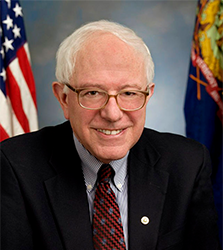
Sanders’ Outreach to African-Americans May Sustain Campaign
The past summer and early fall were good for Vermont Sen. Bernie Sanders. First thought by many to be a quixotic candidate with little chance to rise into serious contention for the Democratic nomination, he quickly established himself as the clear alternative to frontrunner Hillary Clinton. But recent weeks have been less kind. He is now attempting to reinvigorate his campaign, in part by continuing his efforts to woo voters critical to expanding his base. From this morning’s Politico:
Sanders courts black voters in O'Malley's Baltimore
Bernie Sanders’ presidential prospects may be shrinking, but when he stepped off a campaign bus into the heart of this struggling city Tuesday, he was met by a spontaneous chorus of residents pleading for jobs and a pathway from poverty….
For Sanders, the visit held manifold significance. He has struggled to connect with minority communities, which could stunt any momentum he gains if he manages to win early Democratic nominating contests in predominantly white Iowa and New Hampshire. Front-runner Hillary Clinton appears poised to dominate the other early contests and holds landslide-level leads over Sanders in national polling, as well as in surveys of African American voters.
The pastors and surrogates who flanked Sanders during his appearance here repeatedly insisted that the 2016 contender still has time to make inroads in their community before primary polls open.
“He’s a senator from Vermont that has an overwhelmingly white population. That’s not his fault," said Nina Turner, a former Ohio state senator who recently flipped her support from Clinton to Sanders and joined Sanders on the trail. “As he crisscrosses this country, people are going to hear his message and I believe that they’re going to respond to his message in the same way I did once I pulled back all the layers of what the status quo is and who I was supposed to support.”
The Hill has an article this morning that explains why Sanders is so concerned about expanding his appeal – the Clinton campaign is already preparing to knock him out of the race early:
Clinton World wants to knock Bernie Sanders out of the Democratic presidential race with a resounding win in the Iowa caucuses.
If the threat from Sanders isn’t neutralized by the Feb. 1 caucuses, allies of Hillary Clinton hope to finish off the liberal challenger on March 1, when 12 states hold contests on what’s commonly called Super Tuesday.
The ambitious schedule reflects growing confidence within Clinton’s team that 2016 will not be a repeat of 2008, when a liberal challenger named Barack Obama upset the then-New York senator in Iowa and started on a trajectory toward winning the Democratic nomination…
Sanders’ strategy for effectively challenging Clinton once the voting starts depends on a win in New Hampshire:
The one hurdle the Clinton campaign faces is New Hampshire, where the former first lady and the Vermont senator have been locked in a tight race for months. Clinton could effectively slam the door shut on Sanders with a win there on Feb. 9.
Mitch Stewart, who served as a senior adviser to the Ready for Hillary political action committee and is a veteran of both Obama presidential campaigns, said when it comes to Clinton nailing down the Democratic nomination, “the big question is New Hampshire.”
If she wins, Stewart predicted, it would be “a death blow” to Sanders.
But even a Sanders win in New Hampshire may not mean much:
Christy Setzer, another Democratic strategist … [said] that a New Hampshire loss “is easily explained and forgiven” because Sanders is from neighboring Vermont and voters there “prefer insurgents to establishment candidates.”
“Al Gore nearly lost New Hampshire to Bill Bradley, and in the end, Bradley wasn’t even a credible threat,” Setzer explained. “So long as she seals it up with a South Carolina win right after, a Granite State loss would hardly be a speed bump, let alone a stoplight.”
Sanders probably has to either win or run a very, very close second in South Carolina and Nevada in order to remain a serious challenger to Clinton. Key to that will be locking up the votes of the non-white voters that have eluded him so far. His outreach to African-American voters began in earnest several months ago, and his Baltimore trip is one of many attempts to connect with this vital Democratic constituency. Time is running out however, and if he doesn’t see gains in support soon, it’s likely he will be unable to offer a viable alternative to Clinton.



